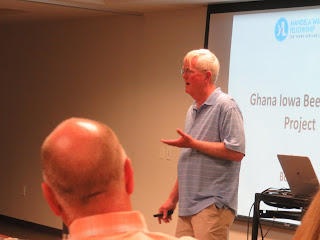East
Central Iowa Beekeepers Association
Minutes
from June 11, 2018
The
meeting was called to order at 6:30 by president Dave Irvin
New
members were introduced and welcomed.
Dave
gave a treasury report. Beginning balance was $223. $125 was spent
for the tent at the 2018 Johnson County Fair, half of which was
reimbursed by the Burr Oak Land Trust, which will be sharing the
tent. $70 was spent to reimburse for mailing costs (envelopes,
stamps, and mailing labels).
A
sign-up sheet went around for people to sign up for our tent at the
Johnson County Fair. The fair again will be 4 days, July 22-25th,
but this year will begin on a Sunday and end on a Wednesday.
Updates
from Floyd:
--The
State Fair will be held August 9 through the 19th.
Information about entering items to be judged can be found in the Iowa Honey Producer's newsletter—TheBuzz. The Iowa
Honey Producers will also be looking for people to volunteer to work
in their area, answering questions and selling products. Free fair
admission is given to volunteers.
-Iowa
Summer Field Days, an annual event, will be held Saturday, June 30th,
at Dordt College in Souix Center, Iowa. Pre-registration is required
and limited. Information can be found on the Iowa Honey Producers
web site.
--Swarm
season is at hand. Various members discussed their experiences with
swarms this season. Floyd reminded people to watch your hives for
wax moths already, and don't have more boxes on hives than bees can
occupy and protect.
--Paul's
Discount still has some bee equipment for sale as part of its closing
sales.
--Floyd
mentioned a beekeeper who used Apivar last August and had 100%
survival over winter.
--Patty
Stewart pointed out that the local publication Tidbits
has articles about honey.
Bob
Wolfe:
Bob
gave a presentation on his trip this May to Ghana, Africa, to work in
a collaborative project involving value added bee products, such as
lotions, candles, creams, honey, royal jelly, pollen, propolis, bee
bread and even bee venom. Following is a summary of his talk.
The
project was a collaborative effort working with members of the
Mandela Washington Fellowship for Young African Leaders. The goal of
the program is not to eliminate poverty directly but to enhance
opportunities for success, according to Bob. Products derived from
beekeeping can be a way for people in Ghana to develop successful
economic enterprises. Honey is a valuable commodity, being six times
more expensive than oil.
The
project involved learning about teaching about product development,
marketing, holding workshops, making fielf visits, and holding
community dialogues in three distinct regions. Workshops included
working on hive construction, making creams and lotions and candles,
among other things. Hives are of the top bar variety, with an
African twist. Instead of the tapering sides, due to lack of tools
to create those the hives are made from whatever wood is available
and made into a square shape, typically 30 to 35 frames in length,
with corrugated metal covers. Hives are kept on a metal stand with
heavy oils put at the base of each leg to control ant infestations.
The lotions have an oil base, varying amounts of wax depending on the
consistency desired for each type, with selected essential oils added
as well.
Bob
indicated beekeepers in Ghana work with two types of stingless bees
and then the African honey bee. The stingless bees produce small
amounts of honey in what are called “honey pots”, made from a
combination of wax and propolis. Where Bob visited, the two
varieties were kept in hives in two separate locations, former
chicken coops. The African bees present quite a challenge, as they
are very aggressive. Even with very warm temperatures, it is
essential that the beekeeper wear a full, long set of clothing under
a full bee suit with any possible tiny opening covered with duct
tape, since the bees will enter even the smallest opening. Bees are
worked at night, with flashlights, in the jungle, when the bees are
most calm (which isn't very!) and only once a month. Honey is cut
from the comb and brood returned to the hive. The African bees do
not have many of the diseases and pests we face in the West.
Bob
plans to return to Ghana again and feels the project was successful.
Ghanans face many challenges, such as tools and equipment, but
inroads are being made to help with education and marketing.
Bob
followed his talk with a short film about stingless bees. Look for a
link coming soon to our website that will allow you to view the film
online as soon as Bob can get it uploaded.
A
wax strainer, donated by Ed and Rita Porter, former ECIBA members,
was offered to any member who could use it.
Minutes
submitted by Jim Davis, Secretary
********************************************************
Participate in the 2018 North American Mite-A-Thon? Check out
our In the News page for more information.




No comments:
Post a Comment